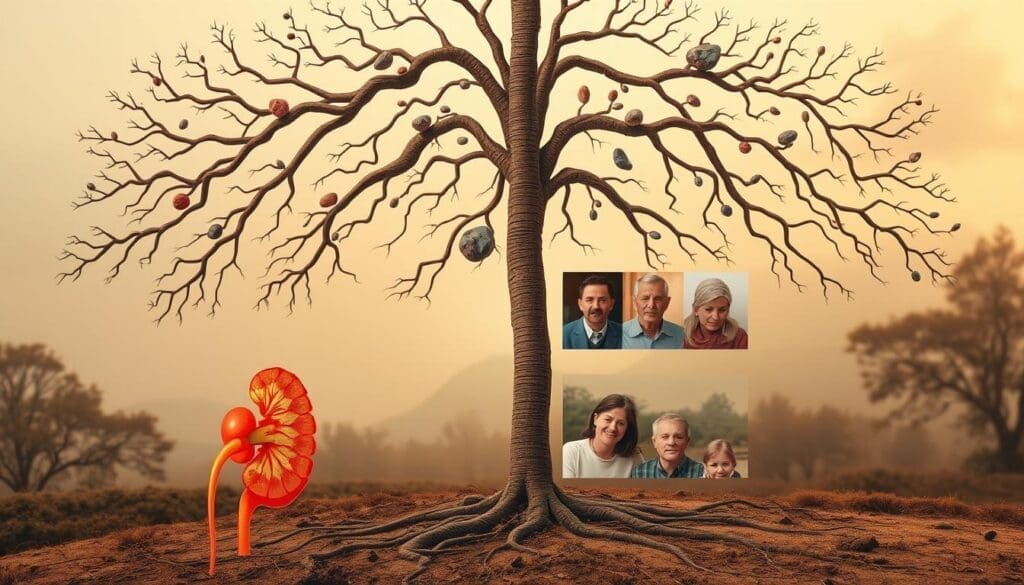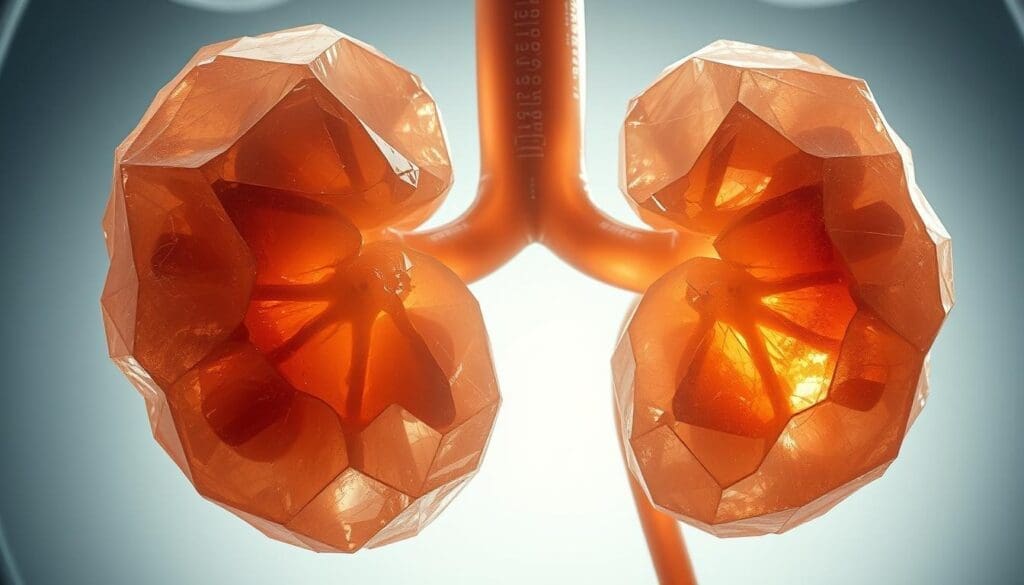Last Updated on November 25, 2025 by Ugurkan Demir

Research shows that people with a family history of kidney stones are more likely to get them. Kidney stone disease hits about 10% of adults. It has a genetic link. Learn why does kidney stones run in the family and the hereditary risks involved. Prevention and early detection tips.
At Liv Hospital, we understand the genetic risks of kidney stone formation. Studies reveal genetics play a big part in kidney stones. So, it’s key for those with a family history to know their risk.

Kidney stones are small, hard deposits that form in the kidneys. They can cause a lot of pain, nausea, and vomiting. If not treated, they can lead to serious problems.
Kidney stones happen when minerals in the urine get out of balance. This causes them to crystallize. The most common type is the calcium oxalate stone. Other types include uric acid, struvite, and cystine stones.
The symptoms of kidney stones depend on the stone’s size and where it is. Common signs include:
If not treated, kidney stones can cause serious problems. These include kidney damage, infections, and blockages in the urinary tract.
Knowing the different types of kidney stones is key. It helps find the cause and plan treatment. The main types are:
By knowing the basics of kidney stones, we can manage and prevent them better. Next, we’ll look at the genetic and hereditary factors that play a role in their formation.

Studies show that family history is linked to kidney stones. This link is seen in many studies. It shows how important it is to understand the family side of kidney stone formation.
Research finds that family history raises the risk of kidney stones. People with relatives who have had kidney stones are more likely to get them. This shows a genetic link to kidney stones.
Studies have looked into how family patterns affect kidney stones. They found that many people with kidney stones have family members with the condition. This suggests a hereditary link.
About 30-60% of people with kidney stones have a family history. This range varies due to different study groups and definitions. Yet, it shows heredity’s big role in kidney stones. Knowing this can help spot those at risk and prevent them.
Looking at the evidence, family history is key in kidney stone risk. As research digs deeper into genetics and environment, family history’s role becomes clearer.
Research shows that heredity plays a big role in kidney stone formation. Knowing this helps us find people at risk and create better prevention plans.
Kidney stones are shaped by both genes and environment. Diet, how much we drink, and lifestyle are important. But genes can also raise our risk a lot.
Studies find that genes affect how much stone-forming stuff is in our urine. They also impact the presence of substances that stop stones from forming. Plus, they can change how our urinary tract works.
Genetic predisposition can make us more likely to get kidney stones. This is because of how genes affect calcium, oxalate, and urinary tract function.
Twin studies have given us a lot of insight. They show that genes are responsible for 45% to 56% of kidney stone cases. This means genes play a big part.
These studies look at the difference in kidney stone rates between identical and fraternal twins. This helps us understand how much genes contribute to the disease.
| Study | Heritability Estimate |
| Twin Study 1 | 45% |
| Twin Study 2 | 56% |
To spot hereditary patterns, we look at family histories and genetic data. This helps doctors figure out our risk better. They can then create plans just for us.
These plans might include changing our diet, drinking more water, and other specific steps. We know genes are important, but they’re not the only thing that matters.
Inherited metabolic disorders play a big role in why some people get kidney stones more often. These disorders mess with the body’s normal ways of breaking down food. This can lead to a higher chance of getting stones.
Cystinuria is a rare genetic disorder. It makes the body get rid of too much cystine in the urine. This leads to cystine stones forming.
The genes SLC3A1 and SLC7A9 are to blame. They help move cystine and other amino acids in the kidneys.
Key characteristics of cystinuria include:
Primary hyperoxaluria is another inherited disorder. It messes with how the body breaks down oxalate. This leads to too much oxalate in the urine.
This can cause calcium oxalate stones. It can also damage the kidneys over time.
The main features of primary hyperoxaluria include:
There are other inherited metabolic disorders that can lead to kidney stones. These include conditions that affect how the body breaks down calcium, uric acid, and other substances. These can all play a part in stone formation.
It’s important to know about these conditions. This helps us find people at risk. We can then take steps to prevent stones from forming.
Research has found specific genetic mutations linked to a higher risk of kidney stones. These mutations impact how our body handles minerals and stone formation.
Genetic mutations play a big role in calcium metabolism. Changes in genes affect how our body handles calcium. This can lead to too much calcium in the urine, raising the risk of calcium stones. Genetic variants affecting calcium metabolism are a key factor in kidney stone disease.
Genetic mutations also affect oxalate transport. Mutations in genes for oxalate transport proteins can cause primary hyperoxaluria. This leads to calcium oxalate stones, a common type of kidney stone. The impact of these mutations on oxalate metabolism shows the complex genetic landscape of kidney stone disease.
Studies show 2% to 15% of kidney stone cases are linked to known genetic mutations. This highlights the role of genetics in the disease. Understanding the genetic causes of kidney stone disease can improve diagnosis and treatment.
We know kidney stone disease involves genetics and environment. Finding specific genetic mutations is a big step towards managing and preventing this painful condition.
A family history of kidney stones raises your risk of getting them. This is due to both genes and shared living conditions in families.
Research shows that having a first-degree relative with kidney stones increases your risk. The statistical risk increase is quite high. It’s said to be two to three times higher than the average risk.
This shows how important it is to know about family patterns in kidney stones. Looking at the data helps us understand how genes play a role in stone formation.
The age of onset for kidney stones is often younger in families with a history. Studies show that stones happen earlier in those with a family history. This points to a strong genetic link.
This early onset is a reason to be aware and take preventive steps if you have a family history of kidney stones.
Recurrence patterns are linked to family history. People from families with a history of kidney stones are more likely to get them again. They also tend to have more recurrences.
Knowing these patterns helps in managing and possibly lowering the risk of getting stones again. This can be done through specific treatments and changes in lifestyle.
The family environment plays a big role in kidney stone risk, beyond just genetics. The habits and lifestyle choices families share can either raise or lower this risk.
Diet is key in preventing kidney stones. Families often eat similar foods, which can affect their risk. For example, eating too much sodium and animal protein can up the risk, while calcium and potassium can help lower it.
By eating more fruits, veggies, and whole grains together, families can prevent stones. This also boosts their overall health.
Drinking enough water is vital to avoid kidney stones. Families that drink plenty of water can lower their risk. Aim to drink at least two liters of water per day.
Sharing water habits is helpful. For example, having water at meals and encouraging regular drinking can promote good hydration.
Regional and cultural factors also impact kidney stone risk. Certain diets or habits common in some cultures can increase stone risk. For example, eating a lot of oxalate-rich foods, found in some cuisines, can raise the risk of certain stones.
Knowing these influences can help families make better diet and lifestyle choices. By understanding these factors, families can take steps to lower their stone risk.
By tackling these shared environmental factors, families can lower their risk of kidney stones. This approach, combining genetic knowledge with lifestyle changes, can make a big difference in prevention.
Genetic testing and counseling are key in figuring out kidney stone risk, mainly for those with a family history. They help us understand how genes play a role in stone formation. This knowledge is vital.
There are many genetic tests to find genes linked to kidney stone risk. These tests spot single-gene diseases that cause stones.
Some tests look for:
These tests are important for those with a family history of stones, frequent stone formers, or young stone formers.
Understanding genetic test results is complex. A positive result means you might be at higher risk for stones.
| Test Result | Implication | Recommended Action |
| Positive | Increased risk of kidney stones | Genetic counseling, preventive measures |
| Negative | No identified genetic risk | Continue with general preventive measures |
| Inconclusive | Further testing may be required | Additional genetic testing or evaluation |
Genetic counseling is a must for those with a positive test, a family history of stones, or frequent stones. It offers personalized advice on managing stone risk.
During counseling, a healthcare expert will explain the test results. They’ll talk about prevention strategies and support in making health choices.
Knowing your genetic risk and acting early can lower your stone risk a lot.
Preventing kidney stones is key, and it’s more important for those with a family history. Adopting specific preventive measures can help a lot.
Diet is very important in preventing kidney stones. If you have a family history, try to reduce sodium intake and eat more calcium-rich foods. Also, limit foods high in oxalate, like spinach and beets, if you’re prone to calcium oxalate stones.
Talking to a healthcare provider or dietitian is a good idea. They can help create a personalized dietary plan that fits your needs and stone type.
Drinking enough water is essential to prevent kidney stones. Aim to drink at least 2 liters of water a day. Your urine should be pale yellow or clear, showing you’re well-hydrated.
For some, just changing their diet might not be enough. In these cases, preventive medication options might be needed. These can include thiazide diuretics for calcium stones, allopurinol for uric acid stones, and potassium citrate for certain types of stones.
It’s important to talk to a healthcare provider about the best prevention plan. This includes any medications you might need, based on your condition and medical history.
Diagnosing hereditary kidney stones involves several steps. We’ll look at how doctors use different tools to find and treat these stones. This includes looking at metabolic evaluations, imaging studies, and urine and blood tests.
Understanding why kidney stones form is key. Doctors check levels of calcium, oxalate, and uric acid in the body. This helps them create a treatment plan.
These tests include 24-hour urine collections. They measure substances that can lead to stones. Knowing these factors helps prevent future stones.
Imaging studies are important for diagnosing and treating hereditary kidney stones. Non-contrast CT scans and ultrasound help see the stones and plan treatment. They show the size and location of the stones.
These studies also find other issues that might cause stones. This info helps doctors create a treatment plan that fits the person’s needs.
Urine and blood tests are key in diagnosing hereditary kidney stones. They check for metabolic or genetic issues that might cause stones. For example, urine tests look at citrate, calcium, or oxalate levels. Blood tests check kidney function and look for genetic markers.
Doctors use these test results along with other findings to understand the risk of kidney stones. This helps them create a plan to prevent and treat stones.
It’s key to understand the genetic factors for treating hereditary stone formers. Those with a family history of kidney stones need a custom plan to manage their condition well.
Creating personalized treatment plans is vital for hereditary stone formers. We look at the person’s health, medical history, and genetic factors. “A one-size-fits-all approach is not effective in treating hereditary kidney stones,” say top urologists.
When making these plans, we consider:
For many hereditary stone formers, managing underlying genetic conditions is key. Conditions like cystinuria and primary hyperoxaluria need special care to lower stone risk.
We help patients by:
Long-term monitoring strategies are essential for hereditary stone formers. Regular check-ups and tests help us keep an eye on their condition and adjust their treatment as needed.
“Long-term monitoring is key to preventing complications and improving outcomes for patients with hereditary kidney stones,” according to a recent clinical study.
Our strategy includes:
Knowing your hereditary risk is key to preventing and managing kidney stones. We’ve seen how genetics and family history affect kidney stone development. By spotting those at higher risk, we can take steps to lower their chance of getting stones.
Genetic testing and counseling are vital for those with a family history of kidney stones. Knowing the genetic factors behind stone formation helps us create tailored treatment plans. This way, we can manage genetic conditions better.
Managing kidney stone risk requires more than just knowing your hereditary risk. It also means making dietary changes and staying hydrated. By being proactive, people with a family history of kidney stones can greatly lower their risk.
By understanding and managing your hereditary risk, you can keep your kidneys healthy and overall well-being in check. We urge those with a family history of kidney stones to talk to healthcare experts. Together, you can create a plan to manage your risk effectively.
Yes, many people with kidney stones have family members who also have them. Studies show that 30-60% of those with kidney stones have a family history.
Kidney stones have a strong family link, but they’re not just about genes. Both genes and environment play a part in who gets them.
Certain genetic changes can raise your risk of kidney stones. These changes affect how your body handles calcium and oxalate. Disorders like cystinuria and primary hyperoxaluria also increase risk.
Yes, genetic tests can spot inherited conditions that raise kidney stone risk. But, not all stones are linked to known genes. Tests are part of a full medical check-up.
To lower risk, focus on diet, drink plenty of water, and consider preventive meds. These steps help those with a family history.
Family environment, like diet and hydration, also affects stone risk. Cultural and regional factors can play a role too.
Doctors use metabolic tests, imaging, and urine and blood analysis to diagnose hereditary stones.
Treatments are tailored to the genetic cause and individual factors. Long-term monitoring is key to managing the condition.
While prevention isn’t always possible, a healthy lifestyle can help. A balanced diet and enough water are important. Medical advice on prevention is also helpful.
Yes, family history may mean getting kidney stones earlier in life. Research supports this connection.
Yes, studies show kidney stones often come back in families. Knowing your family history is key to prevention.
National Center for Biotechnology Information. (2025). Why Do Kidney Stones Run in Families Hereditary. Retrieved from https://www.ncbi.nlm.nih.gov/pmc/articles/PMC4138059/
Subscribe to our e-newsletter to stay informed about the latest innovations in the world of health and exclusive offers!